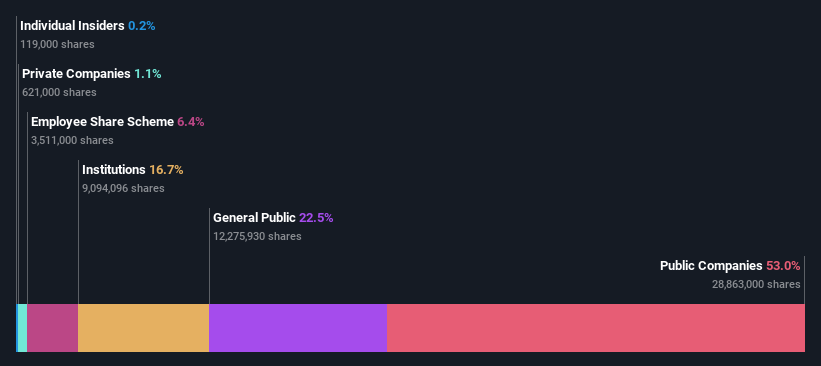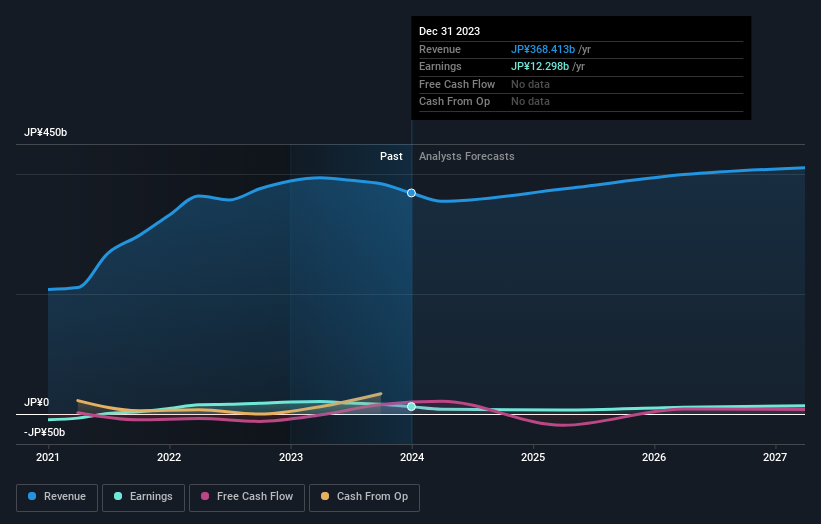Stock Analysis
- Japan
- /
- Metals and Mining
- /
- TSE:5481
Public companies are Sanyo Special Steel Co., Ltd.'s (TSE:5481) biggest owners and were hit after market cap dropped JP¥8.2b

Key Insights
- Significant control over Sanyo Special Steel by public companies implies that the general public has more power to influence management and governance-related decisions
- 53% of the company is held by a single shareholder (Nippon Steel Corporation)
- Institutions own 17% of Sanyo Special Steel
A look at the shareholders of Sanyo Special Steel Co., Ltd. (TSE:5481) can tell us which group is most powerful. The group holding the most number of shares in the company, around 53% to be precise, is public companies. That is, the group stands to benefit the most if the stock rises (or lose the most if there is a downturn).
As market cap fell to JP¥112b last week, public companies would have faced the highest losses than any other shareholder groups of the company.
Let's delve deeper into each type of owner of Sanyo Special Steel, beginning with the chart below.
Check out our latest analysis for Sanyo Special Steel

What Does The Institutional Ownership Tell Us About Sanyo Special Steel?
Many institutions measure their performance against an index that approximates the local market. So they usually pay more attention to companies that are included in major indices.
As you can see, institutional investors have a fair amount of stake in Sanyo Special Steel. This implies the analysts working for those institutions have looked at the stock and they like it. But just like anyone else, they could be wrong. If multiple institutions change their view on a stock at the same time, you could see the share price drop fast. It's therefore worth looking at Sanyo Special Steel's earnings history below. Of course, the future is what really matters.

Sanyo Special Steel is not owned by hedge funds. Nippon Steel Corporation is currently the company's largest shareholder with 53% of shares outstanding. This implies that they have majority interest control of the future of the company. For context, the second largest shareholder holds about 5.9% of the shares outstanding, followed by an ownership of 5.0% by the third-largest shareholder.
While studying institutional ownership for a company can add value to your research, it is also a good practice to research analyst recommendations to get a deeper understand of a stock's expected performance. There is some analyst coverage of the stock, but it could still become more well known, with time.
Insider Ownership Of Sanyo Special Steel
While the precise definition of an insider can be subjective, almost everyone considers board members to be insiders. Management ultimately answers to the board. However, it is not uncommon for managers to be executive board members, especially if they are a founder or the CEO.
Insider ownership is positive when it signals leadership are thinking like the true owners of the company. However, high insider ownership can also give immense power to a small group within the company. This can be negative in some circumstances.
Our data suggests that insiders own under 1% of Sanyo Special Steel Co., Ltd. in their own names. But they may have an indirect interest through a corporate structure that we haven't picked up on. It appears that the board holds about JP¥244m worth of stock. This compares to a market capitalization of JP¥112b. Many investors in smaller companies prefer to see the board more heavily invested. You can click here to see if those insiders have been buying or selling.
General Public Ownership
The general public-- including retail investors -- own 23% stake in the company, and hence can't easily be ignored. While this size of ownership may not be enough to sway a policy decision in their favour, they can still make a collective impact on company policies.
Public Company Ownership
Public companies currently own 53% of Sanyo Special Steel stock. It's hard to say for sure but this suggests they have entwined business interests. This might be a strategic stake, so it's worth watching this space for changes in ownership.
Next Steps:
It's always worth thinking about the different groups who own shares in a company. But to understand Sanyo Special Steel better, we need to consider many other factors. Case in point: We've spotted 2 warning signs for Sanyo Special Steel you should be aware of.
If you are like me, you may want to think about whether this company will grow or shrink. Luckily, you can check this free report showing analyst forecasts for its future.
NB: Figures in this article are calculated using data from the last twelve months, which refer to the 12-month period ending on the last date of the month the financial statement is dated. This may not be consistent with full year annual report figures.
Valuation is complex, but we're helping make it simple.
Find out whether Sanyo Special Steel is potentially over or undervalued by checking out our comprehensive analysis, which includes fair value estimates, risks and warnings, dividends, insider transactions and financial health.
View the Free AnalysisHave feedback on this article? Concerned about the content? Get in touch with us directly. Alternatively, email editorial-team (at) simplywallst.com.
This article by Simply Wall St is general in nature. We provide commentary based on historical data and analyst forecasts only using an unbiased methodology and our articles are not intended to be financial advice. It does not constitute a recommendation to buy or sell any stock, and does not take account of your objectives, or your financial situation. We aim to bring you long-term focused analysis driven by fundamental data. Note that our analysis may not factor in the latest price-sensitive company announcements or qualitative material. Simply Wall St has no position in any stocks mentioned.
About TSE:5481
Sanyo Special Steel
Sanyo Special Steel Co., Ltd., together with its subsidiaries, manufactures and sells special steel products in Japan and internationally.
Flawless balance sheet established dividend payer.

